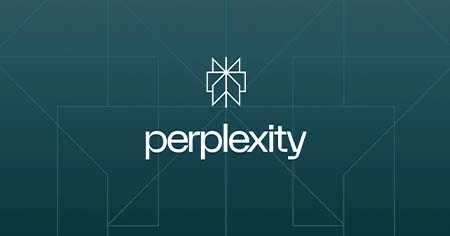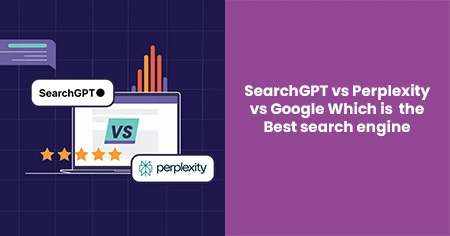While Google has always been the go-to platform, AI-powered applications such as SearchGPT and Perplexity are gaining traction, providing new ways to search and discover content.
So, are you looking for the best search engine to save you time and provide accurate results? Choosing the correct one can feel like a gamble with so many alternatives. But it does not have to be. In this article, we'll review which AI-based search engine tool is best for your needs so you can stop scrolling and find the answers you want.
SearchGPT: AI-Powered Contextual Search

SearchGPT is OpenAI's solution for users looking to get information from the web in a conversational setting. They merged their ChatGPT Language Models with their AI technology to develop an Answer Engine that crawls the web and responds to users' questions.
Key Features
- Conversational Search: Offers a chatbot-like interface for interactive queries and follow-ups.
- Personalization: Tailor's responses are based on user preferences and prior searches.
- Contextual Understanding: Provides nuanced answers by analyzing the entire context of the query.
- Generated Content: Capable of creating summaries, insights, and recommendations.
Pros
- SearchGPT imitates a conversational partner. Unlike traditional search engines, it communicates with users in a back-and-forth manner, making it suitable for those who prefer discussion over trawling through links.
- Because it is built to interpret natural language, SearchGPT excels at dealing with complicated, multifaceted questions. This enables users to avoid lengthy research processes, particularly for general knowledge inquiries.
- SearchGPT maintains the conversation's context, allowing users to ask follow-up questions without repeating information. This is particularly useful for debugging or expanding on initial inquiries.
- SearchGPT provides succinct solutions that avoid an overburden of technical terms or extraneous information. This appeals to consumers who wish to avoid trawling through scholarly or extremely comprehensive content.
Cons
- SearchGPT's expertise may be limited to the data it was trained on. If it has not been updated frequently, it may not provide correct answers to recent events, limiting its usefulness for time-sensitive information.
- While SearchGPT can provide concise responses, more is needed for highly specialized or technical topics, particularly those requiring verified, extensive data.
- Because SearchGPT creates responses rather than linking directly to sources, consumers may question the accuracy of the data.
- Unlike Google, SearchGPT does not show images, videos, or infographics, which is frequently helpful for people looking for varied media resources.
Best For
- Professionals needing in-depth insights.
- Students conducting research or writing assignments.
- Users seeking conversational interfaces.
Perplexity: AI-Driven Exploration

Perplexity is a tool used in language modelling and information theory to assess the quality of language models. A lower perplexity score means the model is more accurate. It is an emerging star in the AI-powered search space, providing conversational and contextually aware results.
Key Features
- Concise Results: Provide brief, to-the-point answers with a list of citations.
- Exploratory Queries: Encourages users to dive deeper into related topics.
- Citations: Displays source links for easy verification of information.
pros
- Perplexity is designed for users who require precise, thoroughly researched solutions. It is ideal for students, researchers, and professionals who value accuracy over speed.
- This tool processes and interprets data-rich material using advanced machine-learning algorithms. It excels in sectors like physics, engineering, and finance, where depth is essential.
- Perplexity frequently includes fact-checking features, which give users trust in the information's accuracy. This is a significant advantage for users seeking verifiable information rather than guesswork.
- Perplexity's comments are frequently delivered more formally, which can benefit users looking for a structured, no-nonsense response rather than a casual conversation.
Cons
- Because Perplexity prioritizes accuracy and depth, replies may take longer to generate, particularly for more complicated or data-intensive inquiries. This could be a disadvantage for consumers who demand speedy responses.
- Perplexity's highly analytical approach may overwhelm those who prefer simple explanations, as its answers frequently contain precise technical information that is difficult to understand.
- Unlike SearchGPT, Perplexity may be less sensitive to casual, conversational questions. Users who expect a more interactive experience may find it less engaging.
- While Perplexity excels in analytical tasks, it may not perform as well in more general or non-academic content searches, limiting its utility for ordinary information needs.
Best For
- Users need quick, reliable answers.
- Researchers are looking for source-backed results.
- Individuals explore new topics with curiosity.
Google: The Search Engine Giant

Google Search is a commonly used search engine developed by Google. It allows users to look up material on the internet using keywords, phrases, or queries. The search engine ranks results based on algorithms that consider relevancy, authority, and user experience.
Key Features
- Massive Web Index: Covers billions of pages, ensuring comprehensive results.
- Rich Snippets: Provides quick previews of answers directly on the search page.
- Customizability: Integrates seamlessly with other Google services like Maps, YouTube, and Drive.
pros
- Google indexes billions of web pages, making it the most powerful search engine. This assures a diverse set of sources for nearly any AI-based search engine, from simple inquiries to complex academic studies.
- Google's algorithms and continuous upgrades ensure users receive the most recent news and information. This is especially useful for current affairs, sports, stock market updates, and local news.
- Google provides a variety of search filters (such as images, videos, news, and commerce) and tools that allow you to easily tailor search results to meet your individual needs, increasing its versatility.
- Google's "Search by Image" tool and customized search operators give consumers more versatility, allowing them to refine their searches based on their needs.
- Google's straightforward UI makes it accessible to many people, from students and professionals to general users who need quick information.
Cons
- The sheer volume of results might sometimes be overwhelming, especially for consumers seeking a specific answer. This may force users to sift through a large amount of content, which can be time-consuming.
- Google's reliance on advertisements and sponsored content can overload the top of search results, potentially pushing organic results down the page. This is less desirable for people seeking unbiased, ad-free information.
- Google is more generic and less personalized to specific users than compared to AI solutions like SearchGPT, which provide a conversational experience. It may not offer sophisticated responses depending on user choices or conversation history.
- Google indexes nearly all accessible content, including disinformation and low-quality sources. Users must exercise caution and discernment to prevent unreliable information.
Best For
- General-purpose searches.
- E-commerce and local business discovery.
- Users are deeply embedded in the Google ecosystem.
Comparative Analysis:
| Feature | SearchGPT | Perplexity | |
|---|---|---|---|
| Ease of Use | High | High | High |
| Index Size | Moderate | Moderate | Extensive |
| Response Depth | In-depth, context-rich | Concise, fact-based | Variable |
| Transparency | Moderate | High | Moderate |
| Ad Influence | None | None | Significant |
| Best For | Research, content generation | Fact-checking, exploration | Everyday searches, business |
Choosing the Right Search Engine
- SearchGPT is ideal for users needing nuanced answers or engaging conversational queries. Its AI-driven approach is excellent for problem-solving, brainstorming, and understanding complex topics.
- Perplexity provides concise, citation-backed answers, making it a reliable tool for researchers and learners focused on fact-based exploration.
- Googledominates with its extensive index and ecosystem integration, making it the best choice for general-purpose searches, local business discovery, and e-commerce.
Each platform offers unique strengths, and the best choice depends on your specific needs, whether they involve precision, transparency, or sheer versatility.
It's critical to prioritize these features according to your specific requirements and budget. Striking the correct balance between must-have features and those that are good but not immediately necessary ensures that your CRM is successful and cost-efficient.
Data security and integrity are crucial in CRM development. To protect critical customer and business data, you must determine who has access to which information within your CRM. This includes setting user roles and permissions that determine access levels for various team members and ensuring data is handled securely and in accordance with data protection requirements.
Step 7: Choose the right technology stack
Choosing the right technology stack is critical in the CRM development process. This stack defines the tools, programming languages, and frameworks that will form the backbone of your CRM development. Correctly choosing guarantees that your system is scalable, efficient, and maintainable.








